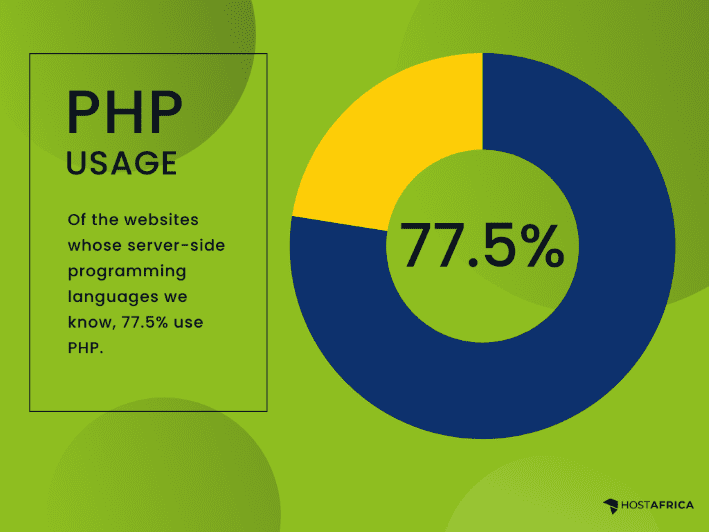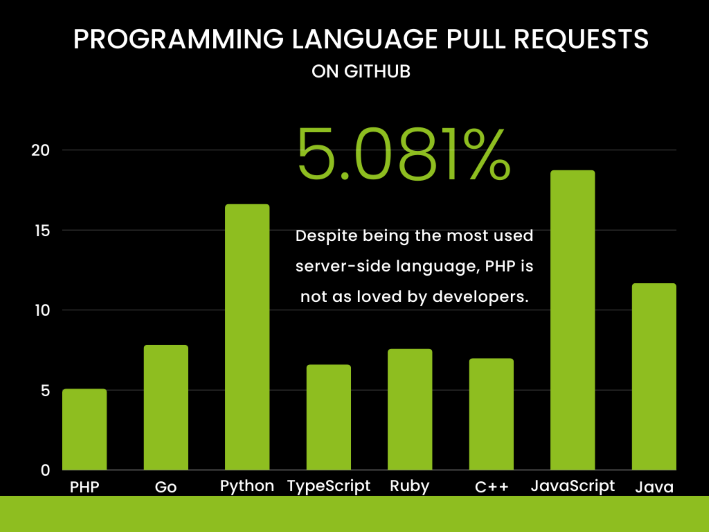

PHP Web Hosting: A Fundamental Guide
Wading into the world of web development can be a daunting task. That’s one of the reasons why understanding technologies like PHP is vital. This fundamental guide on PHP web hosting aims to help you in your journey.
Known as one of the most popular scripting languages on the internet, PHP plays a crucial role in today’s modern web development scenario. We’ll walk you through the A to Z of PHP and its relation to web hosting.
What is PHP: A Brief Overview
Let’s understand what PHP is first, and why it’s important for web development.
Understanding PHP as a Language
PHP, which stands for “Hypertext Preprocessor“, is a popular open-source scripting language.
It was created in 1994 by Rasmus Lerdorf and initially stood for “Personal Home Page”. Its main purpose was to track visits to his online resume.
However, it rapidly evolved into a server-side scripting language designed to develop dynamic and interactive web pages.
PHP scripts are executed on the server, and the result is sent back to the browser as plain HTML.
Unlike client-side languages like HTML and CSS, PHP has the ability to communicate with the backend. Talking to databases, conducting tough calculations, or interacting with other servers, makes it a robust choice for web development.

Significance of PHP in Web Development
PHP plays a crucial role in web development. It’s the language behind some of the biggest platforms on the web, including Facebook and WordPress.
A significant reason for the popular programming language’s widespread adoption sprouts from its accessibility. Being an open-source language, it’s free to use. That also means it’s a cost-effective tool for developers.
Additionally, PHP also enjoys a large and active global community of developers. They continually develop upgrades, resolve bugs, and offer support when they need to. For these reasons and more, PHP has become a key player in web development, democratising the way we interact with the web, one script at a time.
Diving into PHP Web Hosting
Now that you have some background, let’s dig into what PHP web hosting is and the mechanism that makes it run.
What is PHP Web Hosting?
PHP web hosting refers to a service that allows PHP scripts to run efficiently on a web server.
Essentially, it’s a type of hosting environment equipped with the PHP interpreter, which deciphers PHP scripts and displays the output to your audience.
PHP web hosting is designed to deliver a rich set of features. If you want to drive dynamic websites powered by databases, sessions, and complex calculations, you need these features.
Of course, this includes your blogs, e-commerce sites, and various other web applications.
To get a better understanding of PHP web hosting and how to host a PHP website, delve into this informative blog.
The Working Mechanism of PHP Hosting
A PHP hosting environment functions typically like other types of web hosting, but it focuses on interpreting and executing PHP scripts. Here’s how it works:
- When a visitor navigates to a page on your website, the request is sent to the server hosting the site.
- This server identifies that the requested page includes a PHP script, so it passes it to the PHP interpreter.
- The PHP interpreter processes the script, interacts with any other required files or databases, and produces the output, normally in HTML format.
- This output is sent back to the server, which then delivers it to the visitor’s web browser to display the page.

The process may not seem like much, but it’s an impressive feat. PHP hosting makes the execution of powerful web applications possible, allowing for dynamic, interactive, and deeply customised user experiences.
Advantages of PHP Web Hosting
Now that you have a basic understanding of PHP as a language, let’s zoom in on the advantages so you can put your hosting account to good use.
Reliability & Flexibility of PHP Hosting
One of the primary benefits of PHP web hosting is its reliability.
Because PHP is so widespread with an active community, hosting providers have heavily optimised their servers for PHP. The result is great performance, even under heavy traffic.
Flexibility is another advantage of PHP Hosting.
The scripting language doesn’t restrict developers to particular coding rules or regulations. This freedom allows developers to flex their creative abilities and customise their websites according to their specific needs.
Cost-Effectiveness of PHP Hosting
PHP is an open-source language.
This means it’s free to use, and due to its widespread adoption, there are tons of free resources, tutorials, and forums available to assist new users.
This factor makes PHP web hosting particularly affordable. Especially for those just starting their journey in the web development world.
Plus, as PHP is pre-installed on most hosting servers, there are no additional costs involved in using PHP web hosting.
However, it’s crucial to note that while PHP itself is free, some customised PHP applications may come with their costs. It depends on their complexity and the expertise you’ll require to use them.
Nevertheless, for most standard PHP applications, users can expect an affordable solution.

Potential Drawbacks of PHP Hosting
As with everything, PHP web hosting does have some drawbacks.
Understanding the Limitations
While PHP web hosting offers many benefits, it’s not without some downsides. One of the significant drawbacks can be its efficiency.
PHP isn’t the fastest language out there, so for web applications where speed is of paramount importance, alternative languages might serve better.
There’s less control over hosting environments in PHP.
Since PHP is often used in a shared hosting environment, issues could arise from over-consumption of resources. This might lead to slower load times or even downtimes especially during heavy traffic.
Security Concerns with PHP Hosting
When it comes to security, PHP’s open-source nature could potentially be a double-edged sword.
Because the language’s source code is freely accessible, it can be exposed to hackers. Knowing that, it’s crucial for developers to write secure PHP code and for hosts to keep up to date with the latest PHP versions.
Despite these points, remember that all programming languages have their pros and cons. The trick lies in understanding your specific needs and choosing the language and hosting platform that suits you best.
Who Should Choose PHP Hosting?
How do you know if PHP web hosting is for you? Let’s go over some use cases to help you decide if this solution is the right fit for you.
Ideal Users for PHP Hosting
PHP hosting can benefit a wide range of users. If you’re a beginner stepping into the realm of web development, PHP hosting could be an excellent starting point.
Its simplicity and widespread community support make for a welcoming environment to learn the ropes.
Intermediate users can also benefit from PHP hosting, especially if they’re interested in creating dynamic and interactive websites.
PHP’s immense flexibility will allow you to create and customise various web applications, from simple blogs to intricate online stores.
For advanced users and developers, PHP hosting still holds a strong appeal. You’ll be able to develop complex and powerful applications. As you’d expect, this includes content management systems (like WordPress), forums, and e-commerce sites.
WordPress and PHP Hosting
Interestingly, PHP and MySQL play a significant role in the WordPress ecosystem. It’s the core language behind every WordPress website, lending itself to many WordPress installations.
Because WordPress supports PHP, it makes PHP Hosting a popular choice for WordPress users. WordPress themes and plugins are all written in PHP as well. So, a PHP hosting environment is imperative for the efficient functioning and performance of WordPress websites.
Choosing PHP hosting for your WordPress site can lead to better compatibility and a smoother performance. In most cases, it’ll simplify the management and administration of your website.

How to Choose a PHP Web Host
If you’re convinced that PHP web hosting is the choice for you, here’s some factors that’ll help you decide which web host to choose.
Key Factors to Consider
Choosing a PHP web host might seem overwhelming with the numerous options available, so here are a few factors to consider:
- PHP Version Support: Always select a company that offers hosting with the latest version of PHP. This is essential for maximised performance and stability.
- Resource Allocation: Ensure your host provides sufficient resources in terms of memory and processing power to handle your PHP scripts effectively.
- Security Measures: The host should have robust security measures in place, including firewalls, malware scanning, and regular security updates.
- Customer Support: Choose a host that offers reliable and responsive customer service, preferably after hours as well. It can be a lifesaver when you’re stuck or face technical issues.
Top-recommended PHP Web Hosts
A few PHP hosting providers have established a solid reputation in the industry, like HostGator and Bluehost. Choosing a web host that doesn’t have a local presence in your country can present some performance issues.
Take a look at this blog post explaining how big the impact a local versus international web host has on your website.
Remember, the best PHP web host largely depends on your individual needs and budget. If your host includes perks like:
- Free SSL
- Free domain
- Easy-to-use control panel
- Money back guarantee
You’re already off to a good start. If a host offers a free website, you might want to start asking questions, as hosting and website creation are two separate fields.
Coming back to PHP hosting, it’s a dynamic and versatile option for a wide range of users, with a rich list of benefits along with a few minor drawbacks.
As potential customers, the goal is to leverage PHP hosting merits while being aware of its implications, then make an informed decision
Whether you’re a web enthusiast making your debut or a seasoned developer aiming to build robust sites, PHP hosting remains a widely accessible, cost-effective, and powerful solution.
Conclusion
PHP has been around for more than 25 years and is still widely used and trusted by a huge number of developers and businesses.
And there’s a good reason for it – PHP web hosting offers convenience, flexibility, and cost-effectiveness, all while powering dynamic, interactive websites.
As with any language or hosting type, there can be potential downsides like speed and security concerns. But with diligence in using security best practices and keeping abreast with updates, you’re generally in safe hands.
Remember, it’s important to align your individual needs or business requirements with the benefits offered by PHP.
From personal blogs to e-commerce sites, from beginners to WordPress users, PHP web hosting serves a broad user base. Hopefully, this guide gave you a better grasp of what PHP web hosting entails. Maybe it even nudged you towards considering it for your next project.
Should you want to dip your toes into the world of PHP hosting, WordPress hosting is a relatively safe place to start.


